Audio channel divider and compensator.
Dependencies: DokuFFTPACK DokuUSBDevice DokuUSBHost DokuUSBHostWithIso mbed
Fork of Peach_AudioChannelDividerAndCompensator by
日本語の説明は後半にあります。
Outline
This is audio channel dividing filter for multi-way multi-amplifier systems with compensation for system and room response. This program uses 32768 taps of real time 6ch floating point FIR (by FFT and superimpose) for accurate compensation of low frequency. Either USB digital audio stream (USB1) or analog audio signal (LINE-IN of USB-DAC) can be accepted. GR-Peach divide up them into six channel (Low,Mid,High each L,R). Then outputs them to the multi-channel USB-DAC as a USB host (USB0). 32767 taps of FIR coefficient is given by the files in the USB MSD (USB0).
GR-Peach's superabundant process power solves real time 6ch/32kTaps floating point audio FIR in textbook method without any optimization.
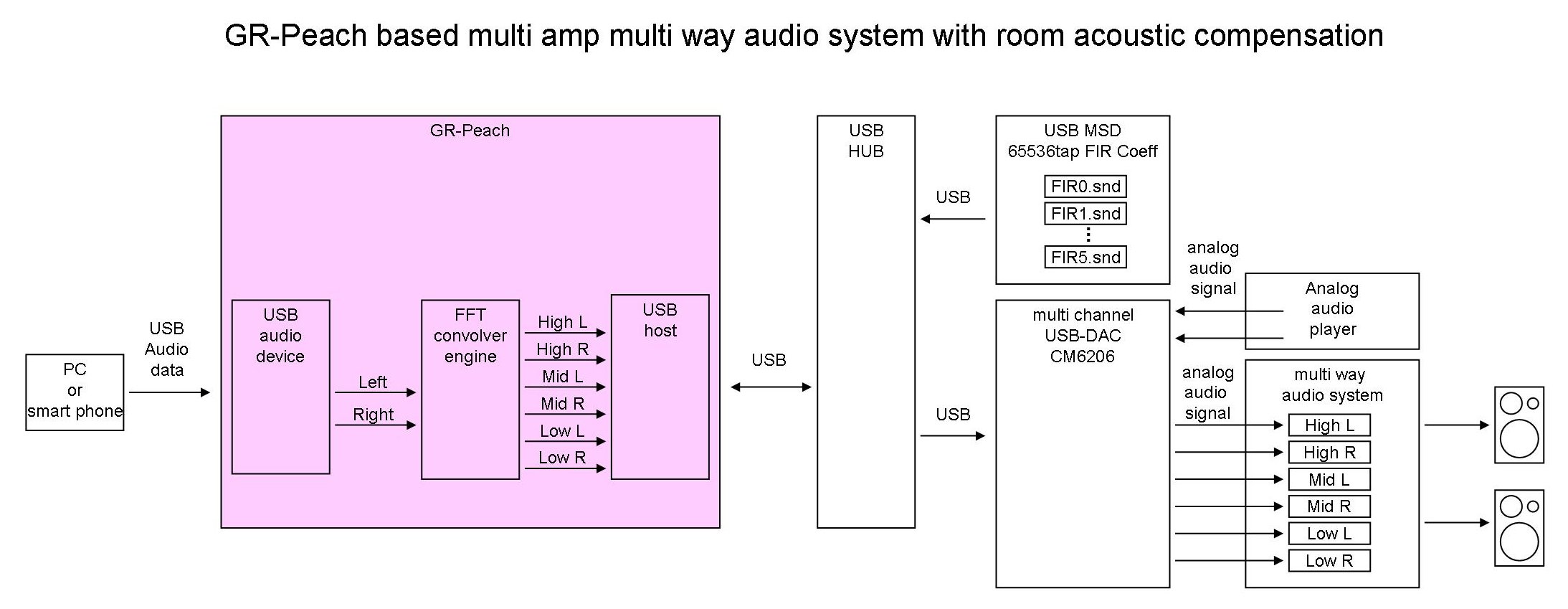
Sorry
This cord works but doesn't tested completely, can work with multi-channnel USB-DAC CM6206 chip inside.
Connection
To use this program, connect USB0 of GR-Peach to a self powered USBHUB, a multi-channel USB-DAC(CM6206 chip inside / e.c.DN-USBSA6CHOPThttp://www.donya.jp/site/item/item_20087.html or RA-AUD51) and a USB mass storage device (coefficient files are saved) to the USBHUB as shown above.
If you would like to accept digital audio stream (16bit/48ksps) as a USB audio device, connect USB1 of GR-Peach to the PC. If not, analog stereo audio signal is accepted.
Filter setting
You can get your favorite cross-over and compensation characteristics modifying FIR coefficient files named Fir_Ch0.snd to Fir_Ch5.snd. Coefficient files are signed 16 bit integer raw formatted sound file (without any header) having time domain responses of the FIRs. Coefficient file have 65536 samples of filter response. but second-half portion of the file (32768 samples) must be zero to work superimpose correctly. If you want minimum phase FIR, filter impulse will be placed at the first sample of the file. If you want liner phase FIR, filter impulse will be placed at 16384 sample of the file.
Sample coefficient files
Sample coefficient files are shown below. store below files in Root folder of USB mass storage device before running the program. These are files for two way systems. Since flatness of frequency response is archived by the compensation, full range speaker works very well without tweeter. In below files, ch0 and ch1 for full range speakers, ch2 and ch3 for low range speakers (woofers), ch4 and ch5 are not used. Of cause, system compensation coefficient is differ according to speaker unit, speaker enclosure, room, and amplifier. Below samples are for my speakers and room.
Compensated coefficient file with channel divider
ch0:full range(high):left:/media/uploads/dokunewon/fir_ch0.snd
ch1:full range(high):right:/media/uploads/dokunewon/fir_ch1.snd
ch2:woofer(mid):left:/media/uploads/dokunewon/fir_ch2.snd
ch3:woofer(mid):right:/media/uploads/dokunewon/fir_ch3.snd
ch4:not_used(low):left:/media/uploads/dokunewon/fir_ch4.snd
ch4:not_used(low):right:/media/uploads/dokunewon/fir_ch5.snd
channel divider without compensation (pushing the user button on the GR-Peach, below coefficients are used)
ch0:full range(high):left:/media/uploads/dokunewon/fir_ch0nc.snd
ch1:full range(high):right:/media/uploads/dokunewon/fir_ch1nc.snd
ch2:woofer(mid):left:/media/uploads/dokunewon/fir_ch2nc.snd
ch3:woofer(mid):right:/media/uploads/dokunewon/fir_ch3nc.snd
ch4:not_used(low):left:/media/uploads/dokunewon/fir_ch4nc.snd
ch4:not_used(low):right:/media/uploads/dokunewon/fir_ch5nc.snd
Filter bypass test coefficient
/media/uploads/dokunewon/fir_bypass.snd
Gain of each Filter
/media/uploads/dokunewon/gains.txt
Measuring system and generating filter coefficient
These coefficient files are generated by a home made audio analyzer tool works on PC below.
/media/uploads/dokunewon/inversex90.zip
Latest beta release /media/uploads/dokunewon/inversex72.zip (Smallest number shows the latest one)
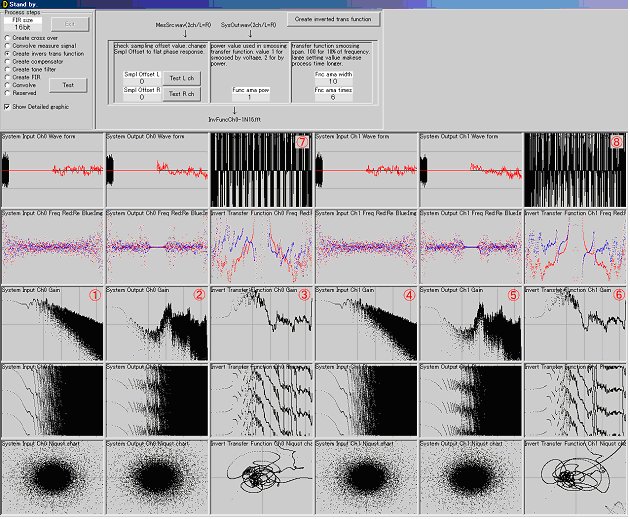
Use above tool reading below manual.
/media/uploads/dokunewon/inversex84.pdf
Latest beta release /media/uploads/dokunewon/inversex72.pdf (Smallest number shows the latest one)
Using this tool, you can configure cross-over frequency and filter dimension for two or three way multi-way multi-amplifier system, measure response of your room and system, generate inverse response transfer function using unique and refined algorithm to create compensation FIR coefficient.
Improvement in frequency characteristic by compensation
Average spectrum of white noise before compensation (By 2 way system High:F77G98-6 x 1 Low:F77G98-6 x 8)
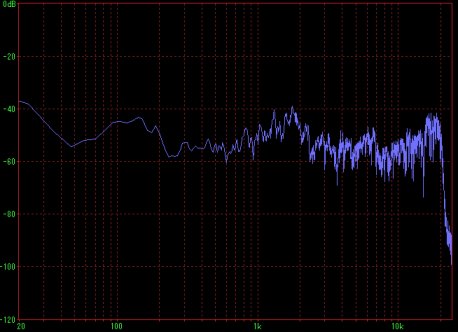
Average spectrum of white noise after compensation (By 2 way system High:F77G98-6 x 1 Low:F77G98-6 x 8)
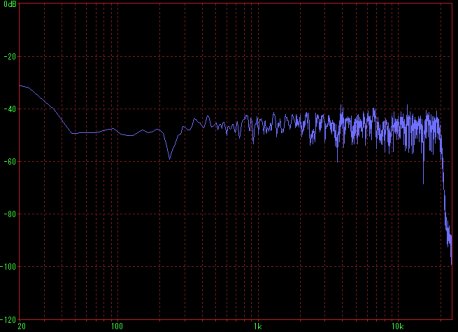
Compensation example
Sorry. Some car noise from the road fronting my house recorded together.
Recorded playback sound by 2 way system (High:F77G98-6 x 1 Low:F77G98-6 x 8)
Early part : normal playback / latter part : compensated playback.
/media/uploads/dokunewon/samplef77g98-6.mp3
Recorded playback sound by low-cost powered small speaker Roland MA-8 (channel divider is not used)
Early part : normal playback / latter part : compensated playback.
/media/uploads/dokunewon/playbacksample.mp3
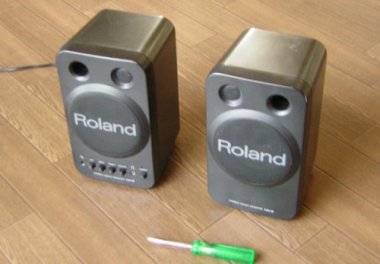
概要
システムの特性補償を行なうマルチアンプマルチウェイシステム用のオーディオチャンネルデバイダです。低音を正確に補正するために、32768タップのFIRを使用しています。GR-Peachの有り余る処理力で、教科書通りのフィルタアルゴリズムが(最適化なしで!)リアルタイムにオーディオ信号を処理します。
本ソフトはUSB1端子に入力されたデジタルステレオ音声信号(48kサンプル16ビットの)か、USB-DACのLINE-IN端子に入力されたアナログステレオ音声信号を、システム特性を補償すると同時に左右各3チャンネルに帯域分割して、マルチチャンネルUSB-DACに出力します。
おわび
このプログラムは一応動くのですが完全にテストされていません。USB-DACは内部にCM6206を使用したものだけに対応しています。

接続
上の図のように、USB0には(できればセルフパワーの)USBHUBを接続し、HUBには、マルチチャンネルUSBDAC(CM6206を使用した、DN-USBSA6CHOPThttp://www.donya.jp/site/item/item_20087.html あるいは RA-AUD51)とFIR特性ファイルを記録したUSBメモリを接続します。
デジタルオーディオ信号を入力する場合は、USB1端子にPC等を接続します。USB1端子に何も繋がなければ、USB-DACのLINE-IN端子のアナログオーディオ信号が入力されます。
フィルタの設定
FIR特性ファイル(Fir_Ch0.snd ~ Fir_Ch5.snd)を変更することで、好みの補正やクロスオーバー特性を得ることができます。特性ファイルはFIRの時間領域の応答を記録した16ビット符号付整数形式のヘッダなしモノラルRAW波形データです。特性ファイルには65536サンプルのフィルタ応答が記録されていますが、後ろ半分は重畳処理の都合でゼロとします。
見本の特性ファイル
見本の特性ファイルを次に示します。これらは、2ウェイシステム用のファイルです。これらのファイルはUSBMSDのルートフォルダに配置します。システム特性の補正によってフラットな周波数特性が実現されるので、トゥイータ無しのフルレンジスピーカーでも良い結果が得られます。チャンネル0と1がフルレンジ、2と3がウーファ、4と5は今回使用しません。もちろんシステムの補償はユニット、エンクロジャー、部屋、アンプ等によって変化します。下の例は、私のスピーカーと部屋のためのものです。(フルレンジは、F77G98-6左右各1本、ウーファはF77G98-6左右各8本を使用しています)
チャンネルデバイダの特性(補償付き)
ch0:full range(high):left:/media/uploads/dokunewon/fir_ch0.snd
ch1:full range(high):right:/media/uploads/dokunewon/fir_ch1.snd
ch2:woofer(mid):left:/media/uploads/dokunewon/fir_ch2.snd
ch3:woofer(mid):right:/media/uploads/dokunewon/fir_ch3.snd
ch4:not_used(low):left:/media/uploads/dokunewon/fir_ch4.snd
ch4:not_used(low):right:/media/uploads/dokunewon/fir_ch5.snd
チャンネルデバイダの特性(補償なし:ピーチの押しボタンを押すと、こちらの特性に切り替わります)
ch0:full range(high):left:/media/uploads/dokunewon/fir_ch0nc.snd
ch1:full range(high):right:/media/uploads/dokunewon/fir_ch1nc.snd
ch2:woofer(mid):left:/media/uploads/dokunewon/fir_ch2nc.snd
ch3:woofer(mid):right:/media/uploads/dokunewon/fir_ch3nc.snd
ch4:not_used(low):left:/media/uploads/dokunewon/fir_ch4nc.snd
ch4:not_used(low):right:/media/uploads/dokunewon/fir_ch5nc.snd
テスト用のバイパスフィルタ
/media/uploads/dokunewon/fir_bypass.snd
各フィルタのゲイン
/media/uploads/dokunewon/gains.txt
システムの測定とフィルタ特性の生成
上記の特性ファイルは次の自作のPC用測定分析ツールで生成しています。
/media/uploads/dokunewon/inversex90.zip
最新のベータ版 /media/uploads/dokunewon/inversex72.zip (数字が小さい方が最新です)

使い方は次のファイルを参照してください。
/media/uploads/dokunewon/inversex84.pdf
最新のベータ版 /media/uploads/dokunewon/inversex72.pdf (数字が小さい方が最新です)
このツールを使用して、クロスオーバーの周波数や次数、システム特性の測定、補償用の逆フィルタの生成が可能です。
補償による周波数特性の改善
補償前のホワイトノイズの平均スペクトラム (By 2 way system High:F77G98-6 x 1 Low:F77G98-6 x 8)

補償後のホワイトノイズの平均スペクトラム (By 2 way system High:F77G98-6 x 1 Low:F77G98-6 x 8)

補償による音声の変化
国道を通る自動車の音なども一緒に入ってますが、悪しからず。
2ウェイマルチアンプシステム (High:F77G98-6 x 1 Low:mid:F77G98-6 x 8)
前半:通常再生音/後半:補償再生音
/media/uploads/dokunewon/samplef77g98-6.mp3
低価格小型パワードスピーカー Roland MA-8
前半:通常再生音/後半:補償再生音
/media/uploads/dokunewon/playbacksample.mp3

Diff: main.cpp
- Revision:
- 11:064c590a51f9
- Parent:
- 10:5e85f83e8e8f
- Child:
- 12:d12709edf53d
diff -r 5e85f83e8e8f -r 064c590a51f9 main.cpp
--- a/main.cpp Sun Oct 18 14:23:16 2015 +0000
+++ b/main.cpp Mon Oct 19 00:27:51 2015 +0000
@@ -26,11 +26,11 @@
#define USB_HOST_CH 0
#endif
-#define IN_DWORDS 32768 //data size in long word buffer 32767 sample stereo
+#define IN_DWORDS 32768 //data size in long word buffer 32767 sample stereo
#define IN_BANKS 2
-#define OUT_DWORDS (3 * IN_DWORDS) //data size in long word buffer 32767 sample stereo * 3
+#define OUT_DWORDS (3 * IN_DWORDS) //data size in long word buffer 32767 sample stereo * 3
#define OUT_BANKS 2
-#define NULL_DWORDS (5 * 8 * 48 * 2 * 6 / 4) //5 ITD full of data to make buffer margin
+#define NULL_DWORDS (48 * 2 * 6 * 100 / 4) //silenc sound data for 100msec
extern int USB_Audio_Attached;
static volatile uint32_t BufR[IN_BANKS][IN_DWORDS];
@@ -55,41 +55,66 @@
Timer Tmr;
+#define TARGET_BUFFER_MARGIN 20 //88 for buffer full at 11 ITDs
+#define OUT_BYTE_PER_MILISEC (48*2*6) //48ksps 2byte 6ch / milisec
+
void UsbSend(void const* arg)
{
- int cnt;
+ int Bank = 0;
+ int Latency,Adjmsec;
USBHostDac * p_usbdac = (USBHostDac *)arg;
+ int SkipBytes;
Tmr.start();
for(;;)
{
- //wait FFT result prepaired
- semW0.wait();
- //if interval is too long, data shortage have happen
- if((cnt = Tmr.read_ms()) > 695)
+ //reset timer to measure waiting time of semahore
+ Tmr.reset();
+ if(! Bank)
+ {
+ //wait FFT result prepaired
+ semW0.wait();
+ }
+ else
+ {
+ //wait FFT result prepaired
+ semW1.wait();
+ }
+ Latency = Tmr.read_ms();
+ printf("Latency:%d\n",Latency);
+ //if semahore's waiting time is too long , data shortage have happen
+ if(Latency > 70)
{
+ Adjmsec = Latency - 40;
+ //it is not nessesary to fill over ITD buffer size
+ if(Adjmsec > 40) Adjmsec = 40;
+ printf("Recover %dmsec\n",Adjmsec);
//put null data into sending queue to prevent data shortage
- printf("Recovered by count %d\n",cnt);
- p_usbdac->send((uint8_t *)BufNull, NULL_DWORDS * 4, false);
+ p_usbdac->send((uint8_t *)BufNull, Adjmsec * OUT_BYTE_PER_MILISEC, false);
+ //no demand for data skip because buffer have some vacancy
+ SkipBytes = 0;
}
- Tmr.reset();
+ //if semahore's waiting time is too short, buffer is nearly full
+ else if(Latency < 10)
+ {
+ Adjmsec = 40 - Latency;
+ if(Adjmsec > 40) Adjmsec = 40;
+ //decrease sending data, to make some vacancy on the buffer
+ SkipBytes = Adjmsec * OUT_BYTE_PER_MILISEC;
+ printf("Skip %dmsec %dByte\n",Adjmsec,SkipBytes);
+ }
+ else
+ {
+ //no demand for data skip because buffer have regular vacancy
+ SkipBytes = 0;
+ }
LedB = 1;
//send music data
- p_usbdac->send((uint8_t *)BufW[0], OUT_DWORDS * 4, false);
+ p_usbdac->send((uint8_t *)&BufW[Bank][SkipBytes / 4], OUT_DWORDS * 4 - SkipBytes, false);
LedB = 0;
-
- //wait FFT result prepaired
- semW1.wait();
- //if interval is too long, data shortage have happen
- if((cnt = Tmr.read_ms()) > 695)
- {
- //put null data into sending queue to prevent data shortage
- printf("Recovered by count %d\n",cnt);
- p_usbdac->send((uint8_t *)BufNull, NULL_DWORDS * 4, false);
- }
- Tmr.reset();
- //send music data
- p_usbdac->send((uint8_t *)BufW[1], OUT_DWORDS * 4, false);
+ //next bank
+ Bank++;
+ Bank &= 1;
}
}
@@ -146,6 +171,9 @@
printf("\n\nStarted\n");
+ //initializing silence buffer
+ memset((uint8_t *)BufNull,0,NULL_DWORDS * 4);
+
//USB sound device initialize
static USBAudio audio(48000, 2, 8000, 1, 0x7180, 0x7500);
